Kalá Nerá, Mount Pelion, Greece, Friday morning, 23 March 2001
Yesterday we started what we plan to be three weeks of traveling. First we go south to Athens with several intervening overnight stops, with Paul and Joann and Elizabeth and Brendan; then the party splits up and we five (in a rented car) go touring the Peloponnese and the Ionian Isles.
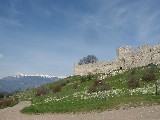
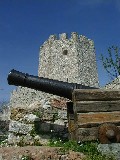
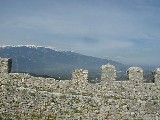 On our way southward to Mount Pelion, we stopped to see the 800-year-old crusaders' castle at Platamónas, which commands fine prospects of the Thermaic Gulf and Mount Olympus. While clambering around the site, being a bit feverish, I took a tumble that drew blood in several places, but it appears I will live.
On our way southward to Mount Pelion, we stopped to see the 800-year-old crusaders' castle at Platamónas, which commands fine prospects of the Thermaic Gulf and Mount Olympus. While clambering around the site, being a bit feverish, I took a tumble that drew blood in several places, but it appears I will live.
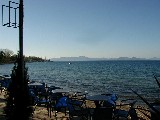
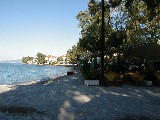 We had decided to stay on the reputedly less scenic but much more accessible southwest side of the mountainous peninsula that is Pelion. Otherwise the mountain crossing would involve a lot of switchbacks, such as had cost us much time and some motion sickness on the tour of Chalcidice (Halkidikí), and it would have to be done again in the morning. We reasoned that an expedition could be got together for just those who wanted to see the other side, and the car would thus be less crowded with persons and luggage for the trip. That expedition never got made, however, and we were the more glad for our decision to stay on the southwest side, because when we found rooms here at Kalá Nerá (after numerous false leads--most places will not open till Easter) I took my fever right to bed while Stas and Elizabeth made a round trip back to Litóhoro for a forgotten and indispensable piece of luggage. The children and their grandparents spent the afternoon at the beach and around and about. I felt better in the morning, and, getting up early, went for a short walk and took these pictures.
We had decided to stay on the reputedly less scenic but much more accessible southwest side of the mountainous peninsula that is Pelion. Otherwise the mountain crossing would involve a lot of switchbacks, such as had cost us much time and some motion sickness on the tour of Chalcidice (Halkidikí), and it would have to be done again in the morning. We reasoned that an expedition could be got together for just those who wanted to see the other side, and the car would thus be less crowded with persons and luggage for the trip. That expedition never got made, however, and we were the more glad for our decision to stay on the southwest side, because when we found rooms here at Kalá Nerá (after numerous false leads--most places will not open till Easter) I took my fever right to bed while Stas and Elizabeth made a round trip back to Litóhoro for a forgotten and indispensable piece of luggage. The children and their grandparents spent the afternoon at the beach and around and about. I felt better in the morning, and, getting up early, went for a short walk and took these pictures.
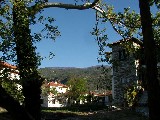
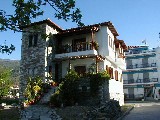 Mount Pelion in myth is the haunt of Chiron the wise centaur (and others not so wise or temperate), the site of the wedding of Peleus and Thetis, and, with its forested slopes, the source of timber for Jason's Argo. It is also noted today for its flowers; the house shown partially at left and more fully at right exhibits both the timber and the flowers.
Mount Pelion in myth is the haunt of Chiron the wise centaur (and others not so wise or temperate), the site of the wedding of Peleus and Thetis, and, with its forested slopes, the source of timber for Jason's Argo. It is also noted today for its flowers; the house shown partially at left and more fully at right exhibits both the timber and the flowers.
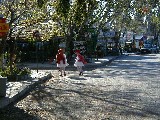
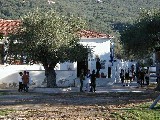 In my morning walk I encountered youngsters in traditional ethnic costume, heading for their school (right), where it would seem some sort of pageant is in the offing, presumably in connection with Independence Day this coming Sunday. (As the American holiday specifically commemorates the signing of the Declaration of Independence in 1776, so the Greek one commemorates the occasion in 1821 when an Orthodox bishop raised the cross in a public square in Patras, in a gesture of defiance that kicked the revolutionary movement into high gear.)
In my morning walk I encountered youngsters in traditional ethnic costume, heading for their school (right), where it would seem some sort of pageant is in the offing, presumably in connection with Independence Day this coming Sunday. (As the American holiday specifically commemorates the signing of the Declaration of Independence in 1776, so the Greek one commemorates the occasion in 1821 when an Orthodox bishop raised the cross in a public square in Patras, in a gesture of defiance that kicked the revolutionary movement into high gear.)
Delphi, the Center of the Earth, Friday afternoon
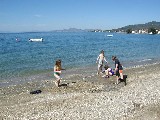
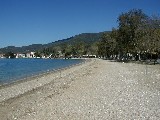
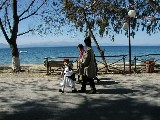 After I wrote the foregoing, we got out a bit more in Kalá Nerá. The kids found and dug out what appeared to be a freshwater spring on the beach; perhaps, though, it was merely a leak in the mains, and had something to do with the general failure of the town's freshwater supply a bit later in the morning (not that I'm suggesting their digging did the damage). We also encountered a pageant straggler, perhaps a younger brother of one of the proper participants.
After I wrote the foregoing, we got out a bit more in Kalá Nerá. The kids found and dug out what appeared to be a freshwater spring on the beach; perhaps, though, it was merely a leak in the mains, and had something to do with the general failure of the town's freshwater supply a bit later in the morning (not that I'm suggesting their digging did the damage). We also encountered a pageant straggler, perhaps a younger brother of one of the proper participants.
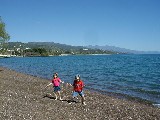
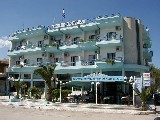 We lunched at Ankhíalos, at the place shown right, by the beach shown left.
We lunched at Ankhíalos, at the place shown right, by the beach shown left.
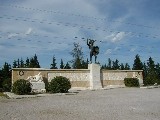 We took a slight detour on our way here to visit the site of the battle of Thermopylae in 480 B.C., marked by this modern monument. Here Leonidas and his three hundred Spartans performed their heroic rearguard action in the second Persian war, perishing all but two men in the defense of Greece from the barbarian. Like the even fewer Athenians who perished in the more successful action ten years earlier at Marathon, these Spartans were given the supreme honor of burial at the field where they fell. I thought, naturally, of the great epitaph, in the truest Laconic style, recorded by Herodotus: "Stranger, go tell the Spartans that here we lie, obedient to their commands." I also thought, the moreso as we were bound for Delphi here, and later in this same trip for Dodona, of A. E. Housman's poem "The Oracles":
We took a slight detour on our way here to visit the site of the battle of Thermopylae in 480 B.C., marked by this modern monument. Here Leonidas and his three hundred Spartans performed their heroic rearguard action in the second Persian war, perishing all but two men in the defense of Greece from the barbarian. Like the even fewer Athenians who perished in the more successful action ten years earlier at Marathon, these Spartans were given the supreme honor of burial at the field where they fell. I thought, naturally, of the great epitaph, in the truest Laconic style, recorded by Herodotus: "Stranger, go tell the Spartans that here we lie, obedient to their commands." I also thought, the moreso as we were bound for Delphi here, and later in this same trip for Dodona, of A. E. Housman's poem "The Oracles":
Tis mute, the word they went to hear on high Dodona mountain
When winds were in the oakenshaws and all the cauldrons tolled,
And mute's the midland navel-stone beside the singing fountain,
And echoes list to silence now where gods told lies of old.
I took my question to the shrine that has not ceased from speaking,
The heart within, that tells the truth, and tells it twice as plain;
And from the cave of oracles I heard the priestess shrieking
That she and I should surely die and never live again.
O Priestess, what you cry is clear, and sound good sense I think it;
But let the screaming echoes rest, and froth your mouth no more.
'Tis true there's better boose than brine, but he that drowns must drink it;
And oh, my lass, the news is news that men have heard before.
The king with half the East at heel is marched from lands of morning;
His fighters drink the rivers up, their shafts benight the air.
And he that stands will die for nought, and home there's no returning.
The Spartans on the sea-wet rock sat down and combed their hair.
Here a digression. The other day in the car Paul and I were talking about Greek resentment of American foreign policy, recently expressed by a cousin specially brought to meet us the morning of our departure. Paul recalled having pointed out by way of a retort that without America he probably would not have had the helicopter with which he helped guard the border with "Skopje" or "F.Y.R.O.M.," as the Greeks insist on calling that new Slavophone country which the international press has lately been mentioning quite often as "Macedonia." I responded that without the Greeks the Americans probably would not have helicopters either. For the whole basis of Western science (and that's only part of it) was laid in the "Greek miracle" between 800 and 300 B.C.: the idea of the world and universe as a kind of machine, governed by natural law rather than divine whim; the idea that such law was at its root mathematical; the idea that truth was objective, stubbornly independent of what you or I or anyone else thought about it; the unfathomably profound idea of "therefore" itself--all these originated in the Greek world during those crucial centuries. Paul objected that without the Greeks someone else would have come up with these ideas, but I countered that they'd had their chance--hundred of thousands of years of Homo sapiens, and even a couple of millennia of "civilization," without doing so. Perhaps the Greeks made a few false moves back then, moves which if made otherwise might have left us a better world; indeed that is one of the chief fascinations, for me, of the study of the Greek classics. But our debt is enormous, and here at Thermopylae it occurred to me that perhaps Churchill was wrong to say of the "Battle of Britain" that "Never in the field of human conflict was so much owed by so many to so few." (Admittedly it is difficult if not impossible to say how much this early Greek defeat contributed, strategically and psychologically, to the ultimate Greek victory against the Persian invaders; but then, historical "what ifs" are always speculative, whether applied to the second of the ancient Persian or of the modern World Wars.)
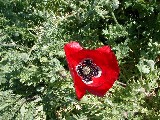 At a stop shortly after I photographed this poppy. They blow everywhere in Greece now, by Thermopylae as in Flanders fields.
At a stop shortly after I photographed this poppy. They blow everywhere in Greece now, by Thermopylae as in Flanders fields.
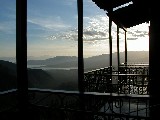
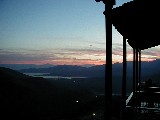 After crossing the mountains of central Greece we arrived here at Delphi and got rooms for the night, of which Paul and Joann's has much the best view.
After crossing the mountains of central Greece we arrived here at Delphi and got rooms for the night, of which Paul and Joann's has much the best view.
previous entry
next entry
main/ToC page


 On our way southward to Mount Pelion, we stopped to see the 800-year-old crusaders' castle at Platamónas, which commands fine prospects of the Thermaic Gulf and Mount Olympus. While clambering around the site, being a bit feverish, I took a tumble that drew blood in several places, but it appears I will live.
On our way southward to Mount Pelion, we stopped to see the 800-year-old crusaders' castle at Platamónas, which commands fine prospects of the Thermaic Gulf and Mount Olympus. While clambering around the site, being a bit feverish, I took a tumble that drew blood in several places, but it appears I will live.








 After I wrote the foregoing, we got out a bit more in Kalá Nerá. The kids found and dug out what appeared to be a freshwater spring on the beach; perhaps, though, it was merely a leak in the mains, and had something to do with the general failure of the town's freshwater supply a bit later in the morning (not that I'm suggesting their digging did the damage). We also encountered a pageant straggler, perhaps a younger brother of one of the proper participants.
After I wrote the foregoing, we got out a bit more in Kalá Nerá. The kids found and dug out what appeared to be a freshwater spring on the beach; perhaps, though, it was merely a leak in the mains, and had something to do with the general failure of the town's freshwater supply a bit later in the morning (not that I'm suggesting their digging did the damage). We also encountered a pageant straggler, perhaps a younger brother of one of the proper participants.





